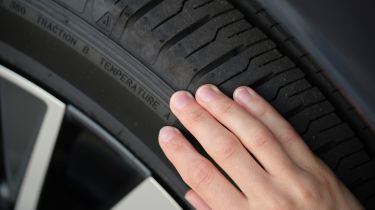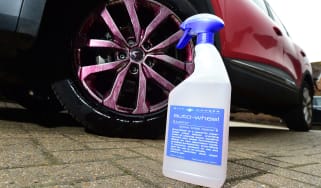Cracked tyres? Safety inspection and prevention tips
Driving a car with a cracked tyre isn’t recommended. Here’s why…

Modern tyres are likely to last at least 20,000 miles before they need replacing, so you’d be forgiven for not giving them a second thought. You could just wait until the garage says it’s time to change them or when they’re listed as an advisory on the MOT certificate. But that could be a costly and potentially dangerous mistake.
As our tyre safety check guide reveals, you should be checking your tyre pressures at least once a month, and this gives you a good opportunity to inspect them for any cracks, bulges or cuts. But what are cracked tyres and how can you prevent them? Read our guide to find out.
What are cracked tyres?
Cracked tyres are tyres that have visible cracks in their rubber surface, either on the sidewalls, tread grooves or where the tyre meets the rim of the wheel.
What causes a tyre to crack?
There are several preventable reasons why a tyre might crack. Age is one of the biggest problems, as rubber naturally deteriorates over time, especially when exposed to sunlight and fluctuating temperatures. Sadly, you can’t prevent the signs of ageing, which makes this sound like an advert for a skincare product.
A tyre will age regardless of how often you use it. On the one hand, a tyre will deteriorate when it’s exposed to the wear and tear of driving, but a lack of use is another serious problem. The chemical that prevents a tyre from drying out is activated when the tyre is moving, so leaving a car parked up for a prolonged period could lead to premature cracking of the tyres.
This is why you should check the age of the tyres when buying a used car. There’s a code printed on the sidewall, with the first two digits representing the week of production and the second two digits representing the year. For example, a code of 3021 would mean that the tyre was manufactured in the 30th week of 2021. A car that’s travelled just a few hundred miles a year for the past decade will almost certainly need new tyres, even if the tread depth is perfectly legal.
The weather also plays a part. Intense UV exposure can degrade the rubber, leading to cracks, which can be prevented by parking the car in the garage or out of direct sunlight. Cold weather can have the same effect, with the problem becoming more severe if the tyres are subject to constant changes in temperature.
Another problem is water, because although tyres are waterproof, excessive exposure to heavy rain or flood water can cause cracks to appear. Even a small crack is enough to let water inside the tyre seal, leading to problems with wheel alignment and braking.
Finally, tyre pressures can play a massive part in cracking. An underinflated tyre will suffer from increased friction with the road, while an overinflated tyre is more prone to bulging, which could result in a blow-out. Don’t ignore the car’s tyre pressure monitoring system (TPMS), which has been required on all new cars launched in the UK since 2014, and get into the habit of checking the pressures at least once a month.
Are cracked tyres dangerous?
A cracked tyre is extremely dangerous and should be changed as soon as possible. If the cracking is caused by age, it’d be worth inspecting the other tyres on the car at the same time. Tyres are often replaced in pairs or as a complete set, so the cracking is unlikely to be limited to just one corner of the car.
Are cracked tyres illegal?
While a cracked tyre isn’t illegal in itself, it could lead to an MOT failure. More importantly, driving a car with a cracked tyre is dangerous for you, your passengers and other road users. It’s not worth the risk.
Remember, the tyres are your car’s only contact with the road, so look after them and they’ll look after you.
Need some replacement rubber? Take a look at the best car tyres to buy now...







